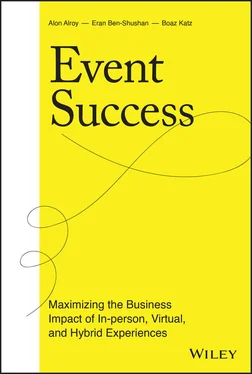Obviously, this is a broad characterization. There are plenty of exceptions, many of which we will highlight in these very pages. Countless event heroes out there shook things up, pushed the needle, and took chances, and we wholeheartedly celebrate their boldness.
But while most industries were adopting an evolve-or-die mentality in the early 2000s and into the 2010s as a result of rapid technological innovation, the events industry found itself naturally inclined to take the opposite route. Rather than feeling pressured to evolve, as so many industries did during that time, event organizers were often under pressure to repeat last year's success—which was based on the year prior, which was based on the year before that, and so on.
According to industry thought leader Marco Giberti, “The formula works well, and it's successful, and it's growing, and it's sustainable in many ways.” He told us recently over Zoom, “Most organizers—corporate, for profit, or associations—were using a playbook that was solid and successful, growing nicely, and the overall reaction was, ‘Why should I change if this is working?’ There's no urgency for deep innovation, there's no urgency for transformation, because it's going pretty well.”
That old playbook, however, has since been rendered obsolete. For the first time, event organizers are now finding themselves in completely uncharted territory and are now being challenged to reinvent an industry long resistant to change.
An Industry Ripe for Disruption
On the surface it appeared that the events industry had been growing steadily; budgets were increasing, attendee numbers were growing, and event organizers were being given license to curate incredible experiences for their audiences.
Apple, IBM, Microsoft, Cisco, Google, Salesforce, Amazon—nearly every major technology company produced a major flagship event for tens of thousands of attendees. Meanwhile, staging a flagship conference became a mark of success for thousands of emerging technology companies. And all this is to say nothing about how nonprofits, associations, media companies, and financial institutions leverage events to drive their own business goals.
A 2018 report published by the Events Industry Council reported that, accounting for indirect and induced impacts, events supported a global economic impact of $2.5 trillion of business sales, 26 million jobs, and $1.5 trillion of GDP. According to a 2021 report from Allide Marketing, the events industry was valued at $1,135.4 billion in 2019 and is expected to reach $1,552.9 billion by 2028, registering a compound annual growth rate of 11.2 percent from 2021 to 2028. 2
Below the surface, however, Marco Giberti says events were simultaneously experiencing a gradual decline—so gradual that it largely went unnoticed. In recent years, the Net Promoter Score (NPS)—a metric used to measure customer loyalty—was flat at best. It was not a dramatic trend by any means, but it suggested something worth considering: both exhibitors and attendees weren't excited about the events they were going to. In other words, the experience of events was missing the mark.
What prevented many decision makers from seeing this decline involved the reliance on business models and benchmarks. The real estate model, for example, more often than not dictated the financial structure of some events. These events were often approached as a simple math equation: X square feet of exhibition space, divided by Y exhibitors, times $Z per square foot in the receivable column; marketing budgets, speaker fees, venue rental, catering costs, and other expenses in the payable column. So long as the revenue generated exceeded expenses, the event was in the black and was considered a success. If certain exhibitors or attendees had a negative experience, it didn't really matter as long as space (and registrations) sold out the following year.
In cases where profitability from exhibitors, sponsors, and registration sales was not the desired outcome (as for many corporate events), event organizers lacked a common set of benchmarks for evaluating how an event contributed to key business outcomes.
Proving event success, or return on events (ROE)as we call it, has long been an incomplete science with event organizers measuring the performance of events on a simple basis—if at all—without a clear understanding of the impact an event has on business outcomes. There was always a sense that things were working as intended, even if “how” or “why” couldn't be precisely measured or explained. The lack of quality metrics to measure vital benchmarks like attendee experience, exhibitor and attendee return on investment, the overall quality of the experience, and so on, created a blind spot for the industry, and in that blind spot complacence was growing.
Unlike most industries at the turn of the millennium, live events had no external forces pressuring them to evolve, no new source of disruption, no real risk of being left behind in the digital era. The only risk was innovating too much too quickly, and inadvertently putting a wrench in an otherwise well-oiled machine.
A Temporary Pause and a Permanent Change
In March 2020, as the COVID-19 pandemic began sweeping across the globe, we watched our internal dashboards as major sponsors started pulling out of events and organizers began postponing and eventually canceling their flagship conferences.
In the ensuing months we heard stories from partners, colleagues, customers, and friends about the internal turmoil that was playing out in event teams around the world. The economic uncertainty of the moment, coupled with the restrictions put in place to limit the spread of the virus, resulted in event budgets getting slashed, team members getting laid off, and widespread uncertainty about the future of events.
Up until that moment, the live events industry felt untouchable. Suddenly, it felt like a hurricane was barreling toward us, and there was nothing we could do but board up the windows and hope for the best.
It was an incredibly painful time for us personally, for our growing events technology platform, and for the industry at large. We, like many others in the industry, had to cut our team by 25 percent, knowing that in the coming months we would either be in a position to hire them back or not have a company at all.
After decades of inertia, the industry was forced to adopt the innovation it had long resisted and seek to reinvent itself. Experimentation and innovation were suddenly no longer a matter of choice, but of survival. As we emerge on the other end of the pandemic, one thing is for sure: the events industry will never be the same. In the coming years, the very definition of the word events will change dramatically, as will the way we measure ROE and event success in the post-COVID-19 era.
Since those dark early days of the pandemic, we've watched as an industry pushed to the brink quickly adopted the necessary tools, skills, and capabilities required to completely reinvent itself in an impossibly short time frame. What could have ultimately spelled the end of events as we knew it instead proved to be the push the industry had long needed to reach its full potential in the Digital Age.
We are only at the starting point of a whole new events industry, and the playbook is still being written, but already we see three key themes that will improve success in the future of events: management, engagement, and growth.
We steadfastly believe that the future of events is about experience-first design—that is, overcoming the decline in NPS scores by creating events that take into consideration the entire suite of stakeholder experiences—from when they first visit a website to the way that they connect with other stakeholders to navigation of the event itself. In order to make this vision a reality, event managers—or event experience managers, as we refer to them—will need to continue to revisit the ways that they manage their strategies and their processes for working with their teams to arrive at these strategies. In order to overcome the challenges of this new chapter in event history, the event team itself will have to undergo a significant transformation.
Читать дальше












